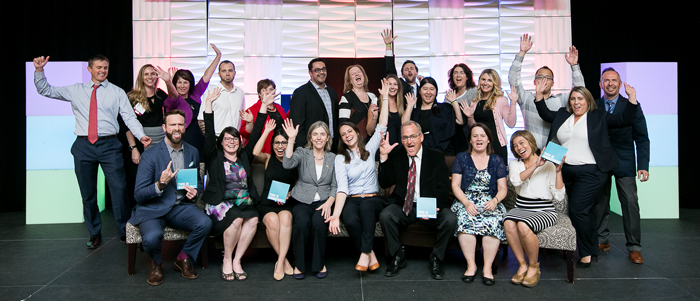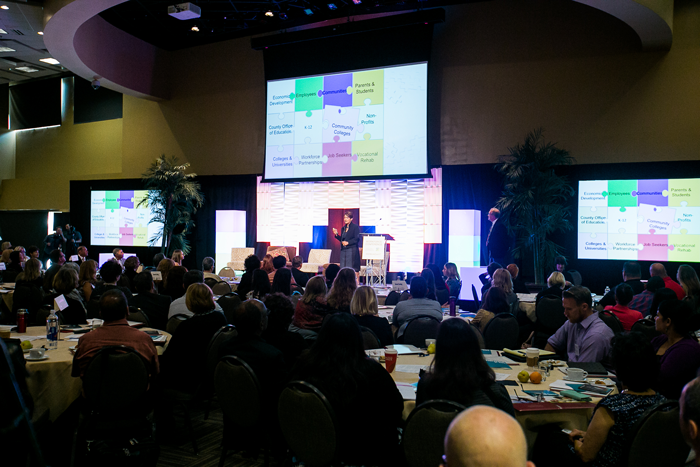
On October 26, 500 educators, community-based organizations, career counselors and community leaders gathered at the Jacobs Center for the sold-out Workforce Conference: Creating Opportunity.
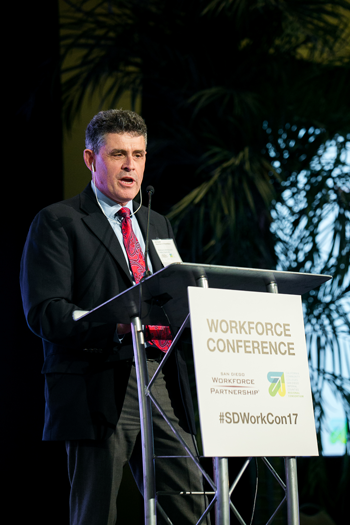
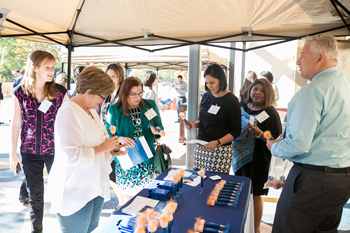
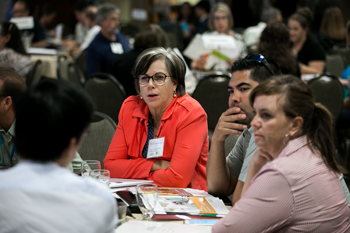
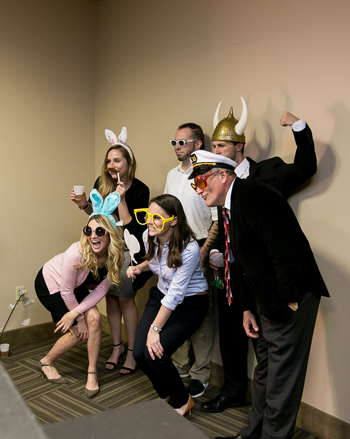
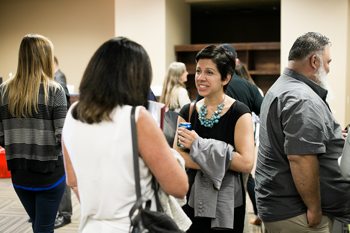 The San Diego Workforce Partnership (SDWP) research team released four reports covering San Diego workforce data:
The San Diego Workforce Partnership (SDWP) research team released four reports covering San Diego workforce data:
- Priority Sector Updates:
- Advanced Manufacturing
- Clean Energy
- Health Care
- Life Sciences
- Information and Communication Technologies
- Tourism
- Public Sector Jobs
- Nonprofit Jobs
San Diego City Councilmember and San Diego Workforce Partnership (SDWP) Policy Board Chair Scott Sherman and SDWP CEO and President Peter Callstrom opened the conference, emceed by SDWP Director of Research and Evaluation Sarah Burns and Foundation for Grossmont and Cuyamaca Colleges/GCCCD Auxiliary Organization Executive Director Sally Cox.
Councilmember Sherman talked about the paid CONNECT2Careers internships at the City of San Diego, which offers opportunities for young adults to experience a civic career.
Dr. Sunita Cooke of MiraCosta College talked about a new annual $16 million for career education at regional community colleges…
“We have to close the achievement and equity gap,” said Dr. Cooke. Likening collaboration to fitting together all the puzzle pieces—community colleges, K–12, employers, nonprofits, job seekers, parents and students, college and universities, etc.—Dr. Cooke said, “Our best work together can only be done when we do this in a coordinated way.”
The first panel of the day, Mission-Driven Pathways, focused on nonprofit jobs in the region. According to the associate director of the University of San Diego’s Caster Family Center for Nonprofit & Philanthropic Research, Dr. Laura Deitrick, the fastest growing fields are higher education, human services and health-related, with a 2.2 percent annual job growth rate.
Joining Dr. Deitrick onstage were Dr. Laurie Coskey, President & CEO of the United Way of San Diego County and a member of the SDWP policy board; Rudy Johnson, President & CEO of Neighborhood House Association; and John Ohanian, President & CEO of 2-1-1 San Diego. The panel was moderated by Cox.
This was followed by a talk called Leveraging a Shortage: Strategic Opportunities for Regional Benefit by Beth Kransberger, Director of the Teacher Inclusion Pathway Program at National University. Kransberger touched on the teacher shortage in California, which experienced the most precipitous drop in teacher prep enrollments since the 2008 recession. Kransberger also shared empirical research that showed a diverse teacher corps benefits all students and decreases the achievement gap for most subgroups.
Kransberger then joined a panel called Becoming an Everyday Hero that focuses on public sector jobs, moderated by Brandy Winterbottom-Whitney, Deputy Director of Human Resources at the County of San Diego. Other panelists included Graham Mitchell, Assistant City Manager at the City of El Cajon, and Jacob Straub, Firefighter/Paramedic with the City of San Diego Fire-Rescue Department.
Straube shared what it takes to be a firefighter: “A servant’s heart and full commitment are keys to successful public safety career…if you’re a firefighter for anything other than to serve others, you’re in the wrong job.”
Next, Wingham Rowan, Director of Beyond Jobs, shared his presentation entitled Elevating California’s Irregular Workforce, which touched on the gig economy. To his knowledge, “San Diego is the first workforce board in the country to look into starting a gig economy market.”
He suggests getting commitment from big employers to participate in this marketplace.
“If you make the irregular labor market work better, it actually becomes a positive intervention in the economy,” said Rowan.
After Rowan’s presentation, Phil Blair, CEO of Manpower Staffing/San Diego and Workforce Development Board Chair, moderated a panel on tourism jobs called More Than a First Job. Joining him were panelists Mary Burton, VP of Human Resources at SeaWorld San Diego, and Joe Eustice, President of the San Diego Hotel-Motel Association.
After a lunch catered by SDWP funded partner Kitchens for Good, attendees heard from Joe Xavier, the Director of the California Department of Rehabilitation (DOR), who talked about his own disability and finding work that provided for his basic needs.
“My real fear was being defined by my blindness and not my talents,” he shared. He eventually found people who “believed in what I could do, not what I couldn’t.”
He said this expectation starts with parents, teachers, community organizations and educators at many levels. Xavier urged attendees to challenge our understandings of disabilities so we don’t limit the success of others, and asked employers to hire someone with a disability.
“See in job seekers what they CAN do, not what they can’t.”
At DOR, 33 percent of employees and 40 percent of the leadership are people with disabilities, which Xavier said models what every business could look like.
“If not you, if not us and if not now, then when?”
SDWP Director of Programs Vicki Brannock then facilitated an interactive session called Applications to Practice: What to Do with All of This Research?, featuring SDWP staff in role play and having audience members discuss at their tables responses to each question posed.
Following the interactive session was Eloy Oakley, the first Latino Chancellor of the California Community Colleges in a talk called Vision for Success.
According to Oakley, the growing income divide in California can be attributed to low education attainment rates.
“Bottom line,” said Oakley, “is we are about social and economic mobility in the California Community Colleges system…The vision is to organize 114 community colleges to help two million students get to social and economic mobility.”
In the final panel of the day called Our Region Today and Tomorrow, moderated by SDWP COO Andy Hall, attendees heard about updates to the Priority Sectors SDWP and the community colleges first identified in 2014. Panelists included Dr. Matt Doyle, Interim Superintendent of the Vista Unified School District; Kathleen Porter, Executive Director Career of Technical, Adult and Alternative Education at the Poway Unified School District; and Dr. Javier Ayala, Dean of Career Technical Education/Workforce Development at Grossmont College.
Dr. Doyle shared that most students drop out in the ninth grade, so career awareness should begin as early as middle school if not sooner.
SDWP COO Andy Hall closed the conference sharing statistics around local income mobility. Conditions in Canada allow for better income mobility than in the U.S. “Local conditions matter for income mobility”— our collective work locally matters.
Attendees then enjoyed complimentary brews provided by Amplified Ale Works during a networking happy hour.
Thank you to top-level event sponsors San Diego/Imperial County Community College Association, Kaiser Permanente, KRA Corporation, Manpower San Diego, ResCare Workforce Services and SDG&E.
To read the full reports, visit workforce.org/reports.
To view the panel presentations, visit workforce.org/events/conference2017.
To view photos from the conference, visit our Facebook page. Photo booth images can be found here.
See you next year!
